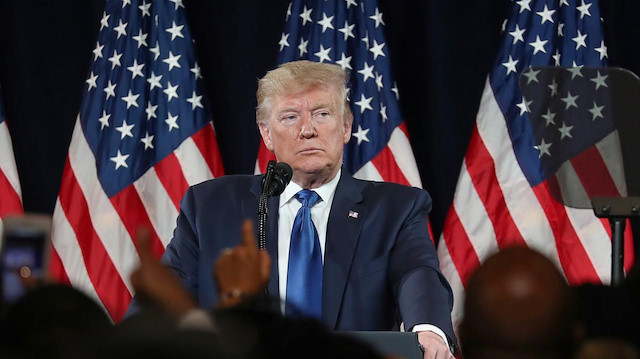

US President Donald Trump
Harvard Law professor Noah Feldman says Constitution's authors 'would conclude that that conduct was impeachable'
U.S. President Donald Trump's attempts to get his Ukrainian counterpart to declare controversial investigations, including into his main political rival, warrant impeachment, nearly all legal experts called by the House Judiciary Committee told lawmakers Wednesday.
The committee's first hearing marked a shift to a new phase in the House of Representatives' ongoing impeachment inquiry and continued to expose stark partisan divides over whether Trump's repeated requests to Ukrainian President Volodymyr Zelensky warrant removal from office.
Harvard Law School professor Noah Feldman, one of three experts called by the panel's Democrats, stood firm in his assessment that the president's actions are impeachable, calling them the embodiment of fears held by the U.S. Constitution's authors.
"If we cannot impeach a president who abuses his office for personal advantage, we no longer live in a democracy. We live in a monarchy or we live under a dictatorship," said Feldman.
"If the framers were aware that a president of the United States had put his personal gain and interest ahead of the national security of the United States by conditioning aid to a crucial ally that's in the midst of a war on investigations aimed at his own personal gain, they would certainly conclude that that was an abuse of the office of the presidency, and they would conclude that that conduct was impeachable under the Constitution," he said.
Feldman, like all experts called by Democrats, concluded Trump's actions warrant impeachment.
The House's investigation is centered on Trump's multiple requests to Zelensky to declare criminal investigations into leading Democratic presidential candidate Joe Biden and his son, Hunter, as well as claims that it was Ukraine, not Russia, who meddled in the 2016 election.
Also at issue is the holdup of some $400 million in congressionally appropriated military aid to Ukraine and whether Trump conditioned the release of that assistance and a possible Oval Office meeting with Zelensky on the Ukrainian president publicly announcing the investigations.
Jonathan Turley, a professor at George Washington University Law School, who was the sole witness called by Republicans, questioned the assessment of his peers, calling the impeachment investigation rushed and questioning whether it lowers the threshold for the solemn task.
"I'm concerned about lowering impeachment standards to fit a paucity of evidence and an abundance of anger," he said. "I believe this impeachment not only fails to satisfy the standard of past impeachments, but would create a dangerous precedent for future impeachments."
He did, however, break with the president on Trump's assessment that his July 25th call with Zelensky was "perfect," adding "his reference to the Bidens was highly inappropriate."
Trump has repeatedly lashed out at the impeachment probe variously as a "witch hunt" and "hoax" and denied wrongdoing, ordering his top officials not to participate in the proceedings.
The president responded to the proceedings on Twitter, retweeting over a dozen posts from House Republicans and the White House, but he has so far refrained from offering personal comment.
#Donald Trump
#impeachment
#Joe Biden
#Jonathan Turley
#Noah Feldman
#U.S.
#Ukraine
#Volodymyr Zelensky




